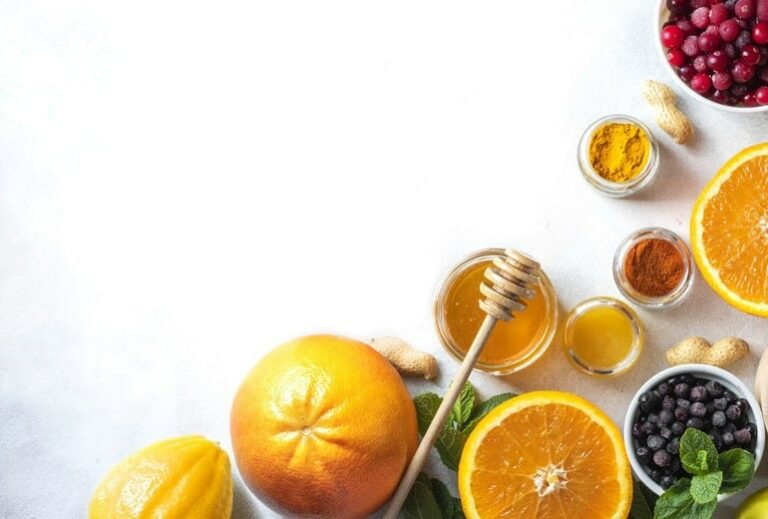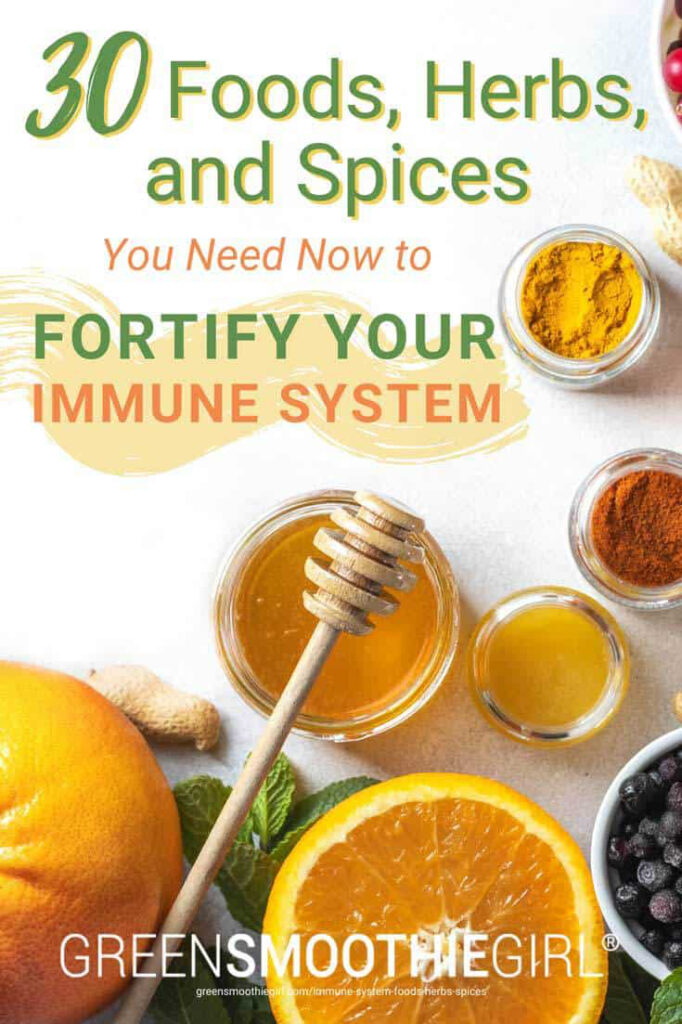30 Whole Foods, Herbs, and Spices You Need Now to Fortify Your Immune System

Whether you’re already making your way through a box of tissues or you want to keep your immune system’s defenses up before germs, viruses, or other pathogens come your way, you can protect yourself through the gift of food.
Read on to discover the best foods, herbs, and spices for supporting your body's natural immune health.
In this article:

Why Should You Choose Whole Foods Over Supplements for Your Immune Health?
Nutrients are more easily absorbed by your body when they are obtained from whole food sources, such as fruits and vegetables, rather than processed foods or supplements.
So, when you want to support your immune system, choose more whole foods instead of looking for nutrients in pills.
Best Foods for Immune Health
Keep your immune system humming along by eating foods with vitamins, minerals, and other nutrients that support immune health. This also means foods that keep your gut health in check, because 70% of the immune system lives there!1
Consuming a diet that is abundant in nutrients with immune-supporting properties can aid in strengthening the immune system, according to research.2
Here are the nutrients you’ll want in your meals to nip any sickness in the bud:
- Vitamin C foods: Probably the most well-known immune system defender, vitamin C is a strong antioxidant that’s important for overall well-being.3 Find it in:
- Citrus fruits
- Papaya
- Kiwi
- Bell peppers
- Broccoli
- Brussels sprouts
- Dark leafy greens
[Related: Does “Vitamin C” (Ascorbic Acid) Really Help?]
- Zinc foods: Zinc participates in nearly all functions of the immune system, so it’s a key mineral to support health4. Zinc can be found in:
- Pumpkin seeds
- Ginger
- Pecans
- Sesame seeds
- Pine nuts
- Cashews
- Lentils
- Selenium foods: This mineral stimulates the production of antibodies in the immune system5. Antibodies protect us from toxins and other substances our bodies don’t recognize. You can get selenium from these foods:
- Brazil nuts
- Sunflower seeds
- Oats
- Spinach
- Brown rice
- Magnesium foods: Magnesium is one of the most important micronutrients, with a strong connection to the immune system. You can get magnesium from these foods:
- Quinoa
- Almonds
- Avocado
- Black beans
- Chia and flax seeds
- Probiotic foods: As I mentioned, getting your gut health in order is important for maintaining immune health. The healthy bacteria found in the following foods help protect you against pathogens or other “bad” bacteria:
- Yogurt (plain, unsweetened)
- Kefir (water, milk, or coconut water kefir)
- Kombucha (in moderation)
- Sauerkraut
- Tempeh
- Pickled fruits and vegetables
- Miso
Mushrooms are another food you don't want to miss for their immune benefits. Mushrooms have considerable immune-supporting nutrients, such as selenium and B vitamins.
The truth is that most whole fruits, vegetables, grains, legumes, nuts, and seeds will be helpful for cold and flu. But, these lists have some great foods to prioritize in your diet in a more targeted way.
Best Herbs and Spices for Immune Health
Don’t forget that your spice cabinet can also double as your medicine cabinet! Plenty of herbs that support the immune system, including some you may already be using every day.
Start adding more of them in cooking, or enjoy them in a tea blend to take advantage of their health benefits:
- Garlic: It’s antibacterial, antiviral, and antifungal, and it can reduce the common cold by 63%6!
- Turmeric: You probably already know about this one, but this vibrantly colored root is used for its anti-inflammatory properties, which are so strong they rival over-the-counter medications like ibuprofen7.
- Ginger: As well as being high in immune-boosting zinc, ginger also contains a compound specifically targeting cold viruses8.
- Cayenne: The heat of this pepper may have you thinking otherwise, but it’s a highly anti-inflammatory spice. Its active component is capsaicin, which has antibacterial qualities that support the immune system9.
- Echinacea: An age-old remedy for shortening the duration of a cold. You can easily find this as tea in any grocery store. Research has shown that echinacea increases white blood cells that fight off infection10.
- Rose hips: Rose hips are the fruit of the rose bush, and these tart little berries are high in vitamin C. You can usually find them in dried form to use in a tea blend at your local herb shop.
- Elderberry: Elderberry is often found as a syrup, a more palatable and natural alternative to the cough syrups you find at the drugstore. The dried berries can be made into tea as well, and they contain the same infection-fighting benefits as echinacea11.
Making sure you consume a nutrient-rich diet is the simplest way to help your body stay well. Including a range of immune-supporting whole foods, herbs, and spices into your regular diet is the best way to achieve this, rather than focusing on just one or two in big quantities.
If you don't know how to start using these herbs medicinally, you can try some of these ingredients in my healing drink recipes for colds, along with some of my favorite immune-boosting smoothie recipes.
And, check out my article on my favorite immune boosters to learn which supplements I always have on hand to prevent (and beat) cold and flu. I make a kit of them to send with each of my kids every year!
In addition to enjoying more nutrient-rich, whole foods, you also want to get regular exercise, stay hydrated, get enough sleep, and manage your stress levels – all to help you avoid getting sick, or get well soon when you're not feeling your best.

Disclosure: This post may contain affiliate links that help support the GSG mission without costing you extra. I recommend only companies and products that I use myself.

Resources
- Vighi, G. et al. “Allergy and the gastrointestinal system.” Clinical and Experimental Immunology. 2008 Sep; 153(Suppl 1): 3–6. doi: 10.1111/j.1365-2249.2008.03713.x
- , , , , , , & (2023). Common foods for boosting human immunity: A review. Food Science & Nutrition, 11, 6761–6774. https://doi.org/10.1002/fsn3.3628
- Carr, A.C.; Maggini, S. “Vitamin C and Immune Function.” Nutrients. 2017 Nov; 9(11): 1211. Published online 2017 Nov 3. doi: 10.3390/nu9111211
- Wessels, I. et al. “Zinc as a Gatekeeper of Immune Function.” Nutrients. 2017 Dec; 9(12): 1286. Published online 2017 Nov 25. doi: 10.3390/nu9121286
- Avery, J.C.; Hoffmann, P.R. “Selenium, Selenoproteins, and Immunity.” Nutrients. 2018 Sep; 10(9): 1203. Published online 2018 Sep 1. doi: 10.3390/nu10091203
- Yang, Y. et al. “Effects of vitamin A deficiency on mucosal immunity and response to intestinal infection in rats.” Nutrition. 2011 Feb;27(2):227-32. doi: 10.1016/j.nut.2009.11.024. Epub 2010 Apr 3.
- Zhen Ou, J. et al. “Potential of in vivo real-time gastric gas profiling: a pilot evaluation of heat-stress and modulating dietary cinnamon effect in an animal model.” Scientific Reports. 6, Article number: 33387 (2016)
- “Chia Seeds.” The Nutrition Source. Harvard T.H. Chan School of Public Health.
- Grzelakowska, A. et al. “The dynamics of vitamin C content in fresh and processed cucumber (Cucumis sativus L.)” Chemistry-Didactics-Ecology-Metrology. 2013;18(1-2):97-102. DOI: 10.2478/cdem-2013-0022
- McMullen, M.K. et al. “Bitters: Time for a New Paradigm.” Evidence-Based Complementary and Alternative Medicine. 2015; 2015: 670504. Published online 2015 May 14. doi: 10.1155/2015/670504
- “Oats.” The World’s Healthiest Foods.
Posted in: Health Concerns, Immunity, Preventive Care, Whole Food














